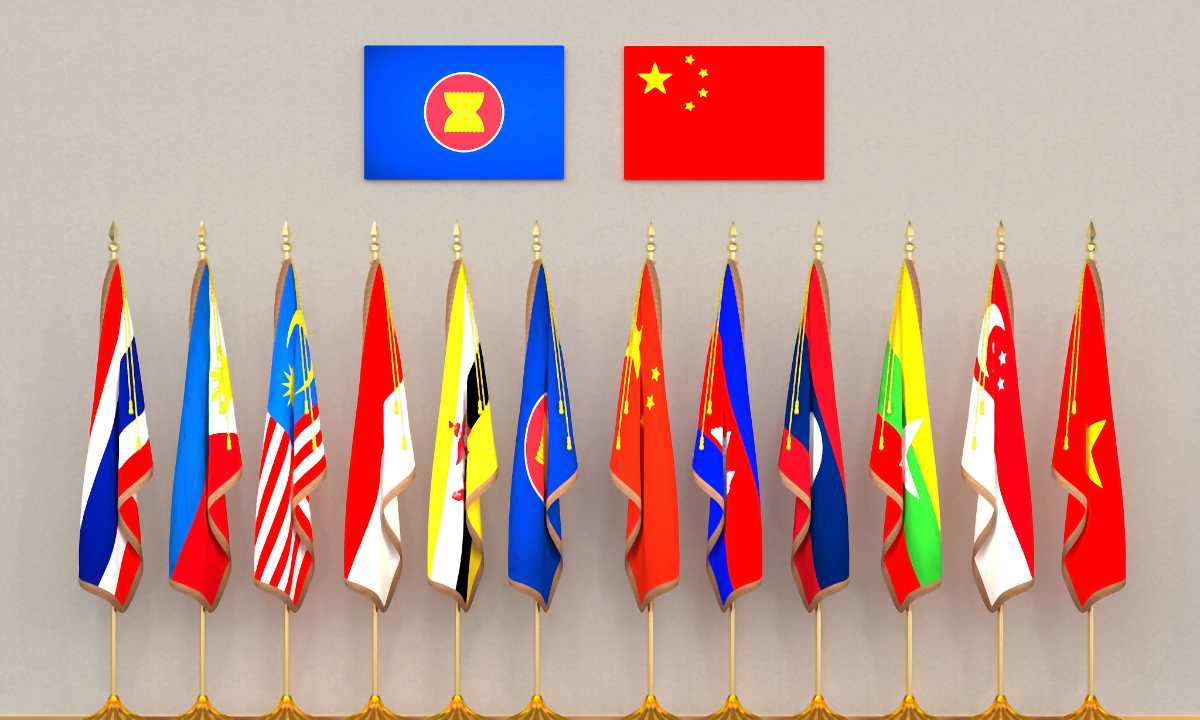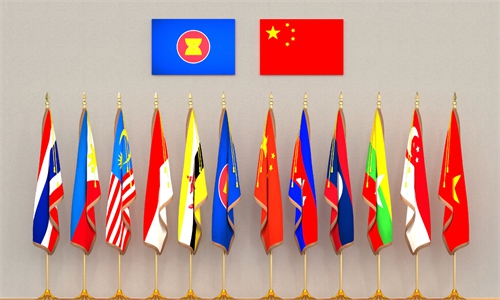
China ASEAN Photo:VCG
While calling for a stronger China-Cambodia friendship and a closer cooperation with East Asian countries, Chinese Premier Li Keqiang on Tuesday kicked off his official visit to Cambodia and will attend meetings with ASEAN leaders, as analysts said Li's visit, together with more recent frequent China-ASEAN interactions, will help facilitate future cooperation and inject more stability to the region amid increasing global challenges.
At the invitation of Prime Minister Hun Sen of the Kingdom of Cambodia, Premier Li Keqiang will attend the 25th China-ASEAN Summit, the 25th ASEAN Plus Three (APT) Summit and the 17th East Asia Summit to be held in Cambodia from Tuesday to November 13, and pay an official visit to Cambodia, the Chinese Foreign Ministry announced.
After arriving in Phnom Penh on Tuesday night, Li said that China and ASEAN have established a comprehensive strategic partnership and become each other's largest trading partner. The current international situation is complicated and undergoing tremendous changes, with all sorts of instabilities, and the global development is facing unprecedented challenges, Li said. He said China hopes the series of leaders' meetings on East Asian cooperation can focus on development and cooperation, insist on upholding multilateralism and free trade, and join hands in coping with challenges, as well as inject new impetus for regional economic integration, and world peace and stability.
Prior to Li's arrival in Cambodia on Tuesday, Cambodian newspapers the Khmer Times and Jian Hua Daily published a signed article by Li, in which Li said that recent years have witnessed continued growth of China-Cambodia relations. The sincere cooperation between China and Cambodia has produced tangible results and "such achievements are taking
This is Premier Li's first visit to Cambodia after the conclusion of the 20th National Congress of the Communist Party of China (CPC). Analysts said that along with Chinese Vice Premier Han Zheng's trip to Singapore from November 1 to 2 and Vietnamese leader Nguyen Phu Trong's visit to China October 30 to November 2, China and ASEAN have had more frequent interactions in recent weeks, showcasing their willingness to further promote bilateral relations and developments, especially amid increasing challenges in the post-COVID era. Stable China-ASEAN relations have been a source of stability for the region and the world.
Boosting cooperation
During his stay in Cambodia, Li will meet with His Majesty King Norodom Sihamoni, and have talks with Prime Minister Hun Sen, Chinese Foreign Ministry spokesperson Zhao Lijian said at a press conference on Friday.
China and Cambodia have been working to update their cooperation mechanism, especially on improving Cambodia's industrial capacity, agricultural cooperation and infrastructure construction, Ge Hongliang, director of the China-ASEAN Maritime Security Research Center at Guangxi University for Nationalities, told the Global Times on Tuesday.
The friendship between China and Cambodia has yielded fruitful achievements in recent years, analysts said. For example, as the China-Cambodia Free Trade Agreement, signed in October 2020 entered into force, bilateral trade has exceeded $10 billion, various fruits have been brought from Cambodia to the Chinese market and major cooperation projects, including the new international airport in Siem Reap and the expressway from Phnom Penh to Sihanoukville, are either under way or have been completed.
China and Cambodia are friendly neighbors and ironclad friends. The two countries have supported each other with bilateral relations showing high-level robustness. Moreover, Cambodia has also played an irreplaceable role in promoting relations between ASEAN and China, Chen Xiangmiao, an assistant research fellow at the National Institute for South China Sea Studies, told the Global Times on Tuesday.
Moreover, as the report to the 20th CPC National Congress has drawn out the Chinese path to modernization and prosperity and noted the importance to investment, consumption and trade, developing closer relations with ASEAN would also help boost bilateral trade and defend regional stability, Chen said.
ASEAN became China's largest trading partner in 2020 for the first time, while China has been ASEAN's largest trade partner for 13 consecutive years since 2009. Moreover, two-way investment between China and ASEAN exceeded $340 billion at the end of July, as the two sides grew into the most active partners in terms of bilateral investment, according to data from China's Ministry of Commerce.
The bilateral relations between China and ASEAN are getting closer as the two sides are working to further promote the Regional Comprehensive Economic Partnership Agreement (RCEP), facilitate deeper integration of the industrial supply and value chains, and promote the interconnectivity of infrastructure and the joint construction of a new international land-sea trade corridor, all of which demonstrate China's diplomacy on building a closer community of a shared future, analysts said.
The general trend of China-ASEAN cooperation will not change and China and ASEAN members have the capability and wisdom to deal with small disputes, for example on the South China Sea, Chen said.
As Premier Li will have face-to-face meetings with leaders of ASEAN members, analysts said the discussions will include issues such as how to advance the process of East Asian economic integration and how to speed up the negotiation of the 3.0 version of the China-ASEAN Free Trade Area.
Ge said that China and ASEAN will focus on how to further implement the comprehensive strategic partnership which was enhanced in 2021 and promote the high-quality development of the China-proposed Belt and Road Initiative to connect with the "ASEAN Outlook on the Indo-Pacific" and facilitate connectivity between China's Global Development initiative with ASEAN's plans on developments.
Responding to the current international situation, China and ASEAN share a consensus on dealing with challenges to the region and the world, including on energy and food crises. However, their cooperation on politics and security is being threatened by US-led external forces as the US has started geopolitical confrontations with small cliques, such as pulling together the AUKUS alliance to contain China and pushing the Indo-Pacific Economic Framework (IPEF) to shake global supply chains, Ge said.
US President Joe Biden will also travel to Cambodia from November 12 to 13 to participate in the annual US-ASEAN summit and the East Asia Summit, the White House said in a statement.
In recent years, the US has ramped up efforts to draw ASEAN countries to its side with more tactics. However, ASEAN countries are becoming more vigilant and have avoided taking sides between China and the US, Chen said.
Faced with the increasing pressure from the US, many ASEAN countries have maintained a balanced strategy between China and the US. For example, many of them choose to join the US-led IPEF and also to participate in the RCEP and use them to facilitate their own development. Moreover, ASEAN members are stressing internal unity to shore up their resilience when faced with outside risks, Ge said.

